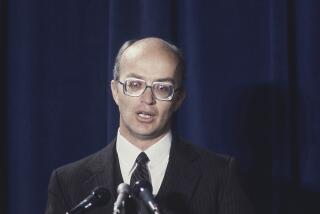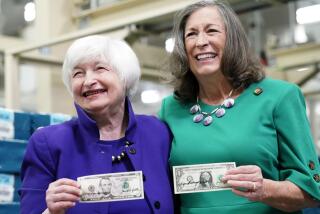O’Neill Couldn’t Stay Out of Hot Water
WASHINGTON — WASHINGTON -- Paul H. O’Neill knew he was an occasional embarrassment to his boss, and he knew it might get him in trouble one day.
After searing himself repeatedly on Washington’s political stove top, President Bush’s blunt-spoken Treasury secretary acknowledged this year he was trying to change his ways. “I’ve touched the hot burner so many times,” he said, “I’m doing my best not to touch it anymore.”
Yet only days before announcing his resignation Friday, O’Neill was expressing reservations about reducing the tax on stock dividends, an idea gaining favor in the White House.
Whether by choice or by compulsion, O’Neill couldn’t keep his finger out of the flame.
“He seems to have been marching to the beat of his own drummer,” said conservative economist Bruce Bartlett, a former Treasury Department official. “Maybe in a different administration, that would have been tolerable. But this is an administration that prides itself on everybody speaking off the same script. Clearly, he was not in sync.”
For most of his life, O’Neill has seemed a little out of step with the company he kept.
He was born 67 years ago into a family headed by a poorly paid orderly at a veterans hospital in St. Louis. The O’Neills pinched pennies and got by the best they could, but it was an unlikely launching pad for a life that one day would lead to the heights of wealth, fame and power.
O’Neill worked odd jobs as a boy, married young and paid his way through college. Ivy League he’s not: O’Neill received his bachelor’s degree in economics from Fresno State College and a master’s in public administration from Indiana University.
Although he is one of the wealthiest men in Washington, O’Neill bristles at suggestions that he has no empathy for the less fortunate. “I started my life in a house without water or electricity,” he said during a heated exchange with Sen. Robert C. Byrd (D-W.Va.). “I don’t cede to you the high moral ground of not knowing what life is like in a ditch.”
O’Neill began his career in 1961 as a computer systems analyst for the Veterans Administration. He worked his way up the ranks of government bureaucrats. In 1974, he landed the No. 2 job in President Ford’s Office of Management and Budget, where he became friends with two other aspiring administration officials, Dick Cheney and Alan Greenspan.
O’Neill left government service in 1977 for a career in the private sector. He became vice president and later president of International Paper Co., one of the nation’s biggest corporations.
A decade later, the board of Alcoa Inc. was looking for a chief executive to restore the ailing aluminum producer to financial health. One of its directors, Greenspan, recruited O’Neill for the job.
O’Neill turned Alcoa back into an industrial powerhouse, boosting its revenue, profit, stock price and market share. For his efforts, he was richly rewarded: The stock and options he received as CEO were worth more than $100 million by the time he left the job in January 2000 to become the leader of Bush’s new economic team.
But corporate acclaim did not translate into political success.
Almost from the start, O’Neill became known as the loose cannon of Bush’s Cabinet. Instead of an administration band leader, he was perceived as a political troublemaker.
Early in his tenure, O’Neill rankled the rest of the team by telling Congress that the president’s signature tax cut initiative was unlikely to help the economy in the short term.
He roiled international currency markets by saying the administration was not interested in trying to pursue a strong dollar policy.
He antagonized Wall Street securities traders by suggesting he could master their jobs in “a couple of weeks.”
He ruffled feathers on Capitol Hill by characterizing a House tax-cut plan as an exercise in congressional “show business.”
He infuriated Argentina and Brazil by expressing doubts about their use of international aid, only to turn around and endorse emergency bailouts backed by the Bush administration.
O’Neill acknowledged that he had problems sticking to the script. “When I see people doing the scripted stuff, I don’t know whether they can think or not,” he told reporters in August. “I turn my mind off because I figure they don’t really know anything.”
But Cabinet service is Washington’s equivalent of a Broadway musical, and O’Neill’s off-key arias brought consistently unfavorable reviews from the arbiters of political theater.
“Basically, he said things that were not very helpful and sometimes flatly contradicted what people in the White House were saying or doing,” said Alan Reynolds, senior fellow at the libertarian Cato Institute. “He seemed to forget that the Treasury reports to the White House, not the other way around.”
Sometimes he seemed out of touch too, making predictions despite compelling evidence to the contrary. After the Sept. 11 attacks, he said the economy would quickly roar back to life. Instead of a rebound, a recession was already in the cards.
Some observers say it is unfair to blame O’Neill for the administration’s inability to sell the president’s economic agenda.
“It’s not clear the administration has a coherent economic policy,” said liberal economist Dean Baker at the Center for Economic and Policy Research. “Obviously, he wasn’t the person to give them one. But if people are saying he wasn’t a team player, it’s not clear what the team is.”
Others say the very skills that made him a successful corporate executive may have undermined his ability to function as an effective administration spokesman.
“If you’re the CEO of a corporation, you’re a cheerleader, you’re in there trying to rally the troops, to get everybody working together,” said David Wyss, chief economist at Standard & Poor’s in New York.
“Politics is different,” Wyss said. “If you want to make change, you’ve got to convince people change is necessary, and that means not always being on the sunny side of the street.”
In any case, it became clear over time that O’Neill had lost credibility with all of his key constituencies: Wall Street, Main Street, Capitol Hill and, most important, the White House.
For some, the final straw was O’Neill’s decision to spend 10 days touring the impoverished nations of sub-Saharan Africa with Bono, the rock vocalist turned Third World evangelist.
The trip drew the scorn of O’Neill’s critics. But Bono offered a more charitable assessment Friday.
“I saw the AIDS emergency in Africa with Paul O’Neill,” he said through a spokeswoman. “I saw his convictions. We will miss him.”
It is a sentiment shared by some of those who are critical of O’Neill’s tenure as Treasury secretary.
“I’m fond of him,” said Reynolds, the Cato Institute scholar. “He’s quirky. He’s fun. He’s an interesting person.
“But he’d be more interesting somewhere else.”
More to Read
Get the L.A. Times Politics newsletter
Deeply reported insights into legislation, politics and policy from Sacramento, Washington and beyond. In your inbox three times per week.
You may occasionally receive promotional content from the Los Angeles Times.










